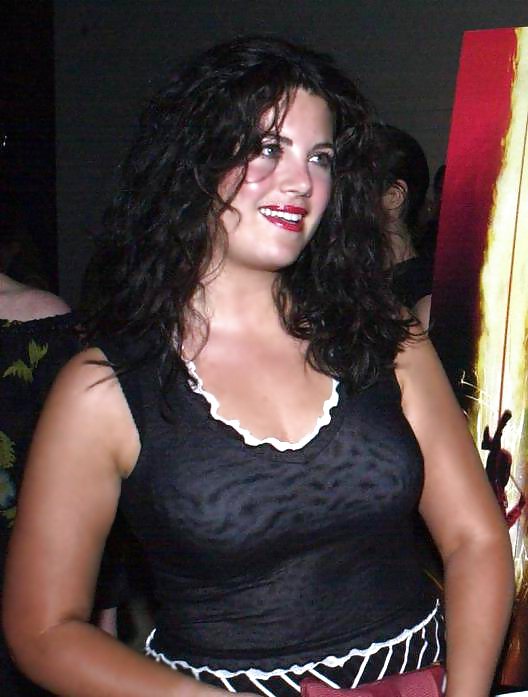When we think about public figures and their stories, it's almost impossible to ignore how media shapes what we see and feel. For Monica Lewinsky, a name that very much became part of public conversation many years ago, her story has seen countless retellings. Yet, in recent times, there's been a shift, a movement towards her own voice being heard, which is rather important.
This shift has brought new layers to how her experiences are shared, particularly in the world of television. There's a growing awareness, you know, that stories like hers deserve a more thoughtful approach, one that respects the person at the center of it all. So, it's not just about what happened, but about how it's presented, and who gets to tell it.
Our platform, for instance, provides a curated archive that highlights the cultural and artistic significance of nude scenes in mainstream media, offering an accessible collection of notable moments from various productions. This collection helps us look at how sensitive topics are handled, and how a story can be told with care, even when it involves moments of great personal vulnerability. This kind of careful collection helps us see the bigger picture, in a way, about storytelling and its impact.
Table of Contents
- Monica Lewinsky: Her Life and Public Narrative
- The 'Impeachment' Series and Her Agency
- The Portrayal of Vulnerability in Media
- Reclaiming a Story in the Spotlight
- How Media Shapes Our Understanding
- Common Questions About Monica Lewinsky and Her Story
Monica Lewinsky: Her Life and Public Narrative
Monica Lewinsky's life, in some respects, became a very public discussion during the late 1990s. Her story, which was deeply personal, quickly moved into the public arena, where it was talked about and analyzed by many. This period, it's fair to say, left a lasting mark on her, and really, on the way we all think about public figures and their private lives.
She was, for a long time, defined by a single event, which is a rather difficult thing for anyone to experience. Over the years, however, she has worked to shift that narrative, to offer her own view of events. This effort has been about more than just setting the record straight; it's been about reclaiming her voice and her identity, which is pretty significant.
Her efforts have helped spark broader conversations about online bullying, public shaming, and the treatment of women in the media. These are, you know, really important topics that continue to resonate today. It's a testament to her strength, actually, that she has managed to turn her difficult experiences into a platform for advocacy, helping others understand the damage that can come from widespread public scrutiny.
Personal Details and Biography
| Full Name | Monica Samille Lewinsky |
| Born | July 20, 1973 (Age varies based on current year) |
| Birthplace | San Francisco, California, U.S. |
| Education | Lewis & Clark College (B.A. Psychology), London School of Economics (M.Sc. Social Psychology) |
| Known For | Former White House intern, public speaker, anti-bullying activist, contributing editor |
The 'Impeachment' Series and Her Agency
The television series 'Impeachment: American Crime Story' brought Monica Lewinsky's story back to the forefront, but with a very different approach. What made this portrayal unique was her direct involvement as a producer. This was, in a way, a major step, giving her a real say in how her experiences were shown to a new generation of viewers.
Her role meant that the story wasn't just being told *about* her, but rather *with* her input, which is a big deal. She could shape the narrative, correct misunderstandings, and ensure that the human elements of her story were truly present. This kind of participation is, honestly, quite rare for someone whose life became so public, and it speaks volumes about her desire for accuracy.
And in a recent interview with The Hollywood Reporter, Monica revealed that she insisted the show’s producers include a scene that will feature Monica, played by Beanie Feldstein. This insistence was not about sensationalism, but about conveying the full weight of her experience, even the most vulnerable parts. It was, you know, a very deliberate choice to ensure authenticity, to show the reality of the situation, even if it meant confronting uncomfortable truths.
The Portrayal of Vulnerability in Media
When media portrays moments of vulnerability, like those implied by the "naked" aspect of a scene, it carries a lot of weight. It's about more than just what's visible; it's about the emotional exposure, the rawness of a character's situation. For a story like Monica Lewinsky's, where she experienced so much public scrutiny, showing this kind of vulnerability in a thoughtful way becomes very important.
The decision to include such a scene, especially one insisted upon by the real person, highlights a commitment to truth in storytelling. It’s a way of saying, "This is part of the experience, and it needs to be seen, not hidden away." This approach, in some respects, challenges viewers to look beyond simple headlines and consider the deeper human cost of public events. It’s a powerful statement about empathy and understanding.
Our platform, as mentioned, provides a curated archive that highlights the cultural and artistic significance of nude scenes in mainstream media. This collection isn't just about showing things; it's about providing context, helping people understand why these moments matter in the broader scope of art and culture. It helps us see, too, how these portrayals can contribute to a more nuanced public conversation about sensitive topics, offering a place to learn more about media representation on our site.
Reclaiming a Story in the Spotlight
Monica Lewinsky's journey to reclaim her story has been a long and public one. For years, her narrative was largely controlled by others, often presented in ways that felt unfair or incomplete. Her decision to speak out, to become an advocate against bullying, and to participate in projects like 'Impeachment' marks a significant shift.
This act of reclaiming her story is, in a way, a powerful example of resilience. It shows how someone can take back control of their own narrative, even after it has been widely distorted. She has used her experiences to shed light on the harms of public shaming and the need for greater compassion in public discourse, which is a rather inspiring thing.
Her advocacy has resonated with many people, particularly those who have faced similar public judgment. She has helped to create a space where conversations about empathy and the consequences of online behavior can happen more openly. It’s a reminder, you know, that even in the face of immense public pressure, individuals can find their voice and make a real difference, helping us understand the power of personal narrative.
How Media Shapes Our Understanding
Media plays a really big part in how we understand the world and the people in it. The way a story is told, the angles it takes, and even the small details it chooses to show can deeply influence our perceptions. For someone like Monica Lewinsky, whose life became a global news event, the media's portrayal has been especially impactful.
When media aims for authenticity, even in difficult or vulnerable scenes, it can help create a more complete and human picture. This is about moving beyond sensationalism to truly explore the complexities of a person's experience. It allows for a deeper kind of empathy, helping audiences connect with the human story rather than just the headlines. It's a way, too, of honoring the person's journey.
By carefully considering how sensitive topics are presented, media can contribute to a more informed and compassionate public. This means recognizing the responsibility that comes with telling someone's story, especially when it involves personal vulnerability. It’s about ensuring that the narrative serves to educate and enlighten, rather than simply entertain, and it’s a very important task for storytellers everywhere. You can learn more about Monica Lewinsky's public journey through various reputable sources, which is quite helpful.
Common Questions About Monica Lewinsky and Her Story
How did Monica Lewinsky contribute to the 'Impeachment' series?
Monica Lewinsky served as a producer on 'Impeachment: American Crime Story,' which gave her a significant role in shaping the narrative. Her involvement meant she could provide direct input on the script, character portrayals, and the overall tone of the show. This was a very deliberate effort to ensure the story was told with accuracy and from her perspective, which is something quite rare for such a high-profile series.
What was the significance of the 'Impeachment' series in telling Monica Lewinsky's story?
The 'Impeachment' series was significant because it offered a chance to re-examine Monica Lewinsky's story with the benefit of hindsight and her direct participation. It aimed to move beyond the tabloid headlines and explore the human impact of the events, giving a more nuanced picture of her experiences and the cultural context of the time. This portrayal, in a way, helped spark new conversations about public shaming and media ethics, which is pretty good.
How has Monica Lewinsky reclaimed her narrative in public life?
Monica Lewinsky has actively reclaimed her narrative through various avenues. She has become a powerful advocate against online bullying and public shaming, giving speeches and writing articles about her experiences. Her role as a producer on 'Impeachment' also allowed her to shape her story's portrayal. These efforts have helped her shift from being merely a figure in a scandal to a voice for empathy and resilience, which is a rather inspiring thing to see.
To truly understand the depth of these portrayals, and how they connect with broader themes of media and culture, you might want to look at other similar discussions on our site. It's a way to keep learning, actually, about how stories are told and what they mean.



Detail Author:
- Name : Jaiden Sawayn
- Username : senger.joanne
- Email : otho34@emard.com
- Birthdate : 1997-05-22
- Address : 49286 Luettgen Fords Nikolauston, TX 58854
- Phone : 636-921-7388
- Company : Morissette-Keeling
- Job : Mental Health Counselor
- Bio : Odit error non eius dolorem autem totam. Deserunt amet dolorum voluptatem ea dolor voluptas dignissimos. Voluptates optio ipsam ab ex et. Nemo omnis sed qui in ex reiciendis.
Socials
twitter:
- url : https://twitter.com/creminr
- username : creminr
- bio : Qui eveniet non sit hic aut perspiciatis quasi nihil. Est vitae placeat dolor aut. Suscipit quis itaque culpa aliquam sunt. Odit animi voluptate quam quis.
- followers : 1191
- following : 147
facebook:
- url : https://facebook.com/rcremin
- username : rcremin
- bio : Blanditiis accusantium iste sequi.
- followers : 1621
- following : 1335
tiktok:
- url : https://tiktok.com/@raheem3450
- username : raheem3450
- bio : Culpa iusto qui ut qui adipisci eum.
- followers : 2349
- following : 386